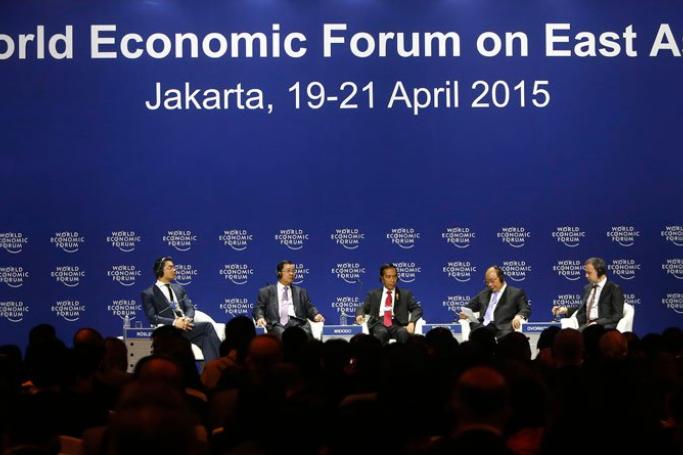The 24th World Economic Forum on East Asia, being held in Jakarta this week, is slated to push for greater public-private partnership initiatives and increase trust among economic players in East Asia in the face of an ongoing global economic slowdown and numerous geopolitical crises.
The event is being held from April 19 to 21 with more than 700 attendees, including representatives from multinational companies like Chevron, Credit Suisse and Hitachi.
Attending the event are regional country leaders, including Myanmar President U Thein Sein.
“As the world’s only international institution for public-private cooperation, the World Economic Forum is holding this meeting at a time where enhancing trust will be a defining factor in eliminating societal and political polarization,” Mr Sushant Palakurthi Rao, senior director and head of Southeast Asia at the World Economic Forum, said at a press conference in Jakarta.
Leaders from major Indonesian conglomerates like Astra International, Gunung Sewu Kencana, the Lippo Group, Sinar Mas and Royal Golden Eagle are listed as participants at the forum taking place at the Shangri-La Hotel.
Indonesian President Joko Widodo gave the keynote address at the event, whose theme is “Anchoring Trust in East Asia’s New Regionalism.”
The “Grow Asia” food security partnership will be of particular focus of the forum as food security becomes an increasingly pressing issue in the region.
The East Asia region has been considered resilient to the problems plaguing developed economies in Europe and North America, ranging from slow economic growth to high unemployment.
The region’s economy, projected to grow at a rate of more than 7 percent this year, remains one the world’s fastest growing, with star countries including growth driver China and developed economies like Japan and South Korea.
Emerging economies from Indonesia to Myanmar are said to offer attractive opportunities for global investors.
Still, political, social and economic tensions have affected stability — the key over-arching theme.
“To meet the needs of East Asia’s fast-growing economies, partnerships are essential to address people’s rightful demands for greater access to education, meaningful employment and political representation,” Mr Rao said.
He added that the World Economic Forum was committed to creating more “opportunities of responsible investments” in the region, including in Indonesia, Southeast Asia’s largest economy.
“When you have a forum like this, it is a tremendous opportunity. [...] The World Economic Forum is working closely on a wide range of public private partnerships to have a great impact across the nation,” he said.
Reporting from Jakarta Globe, World Economic Forum and Mizzima
You are viewing the old site.
Please update your bookmark to https://eng.mizzima.com.
Mizzima Weekly Magazine Issue...
14 December 2023
New UK Burma sanctions welcome...
13 December 2023
Spring Revolution Daily News f...
13 December 2023
Spring Revolution Daily News f...
12 December 2023
Spring Revolution Daily News f...
11 December 2023
Spring Revolution Daily News f...
08 December 2023
Spring Revolution Daily News f...
07 December 2023
Diaspora journalists increasin...
07 December 2023
Koh Tao murder case prisoners see no change in their status on Thai King’s birthday












